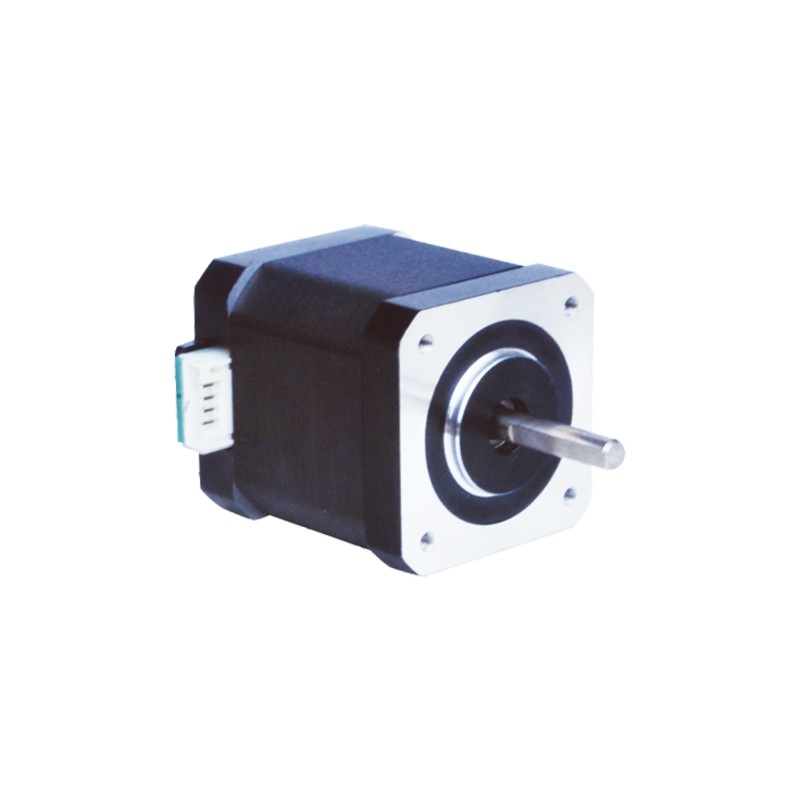Source:Industry News Release time:2022-03-07 Clicks: Popular:Reduction motor manufacturer

Stepper motors are specialized motors designed to precisely control position and speed. Its working principle is to use electronic circuits to convert direct current into time-sharing power, multi-phase sequential control current, and use this current as a stepper motor power supply. The stepper motor can work normally, and the driver is a time-sharing power supply and a multi-phase sequence controller for the stepper motor. Let me introduce to you the differences between 42, 57 and 86 stepper motors.
42 stepper motor refers to a stepper motor with a mounting base size of 42mm, and its maximum output torque is 0.5NM;
57 stepper motor refers to a stepper motor with a mounting base size of 57mm and a maximum output torque of 3.0NM;
86 stepper motor refers to a stepper motor with a mounting base size of 86mm, which is a high-precision motor.
42 series two-phase stepper motor parameters:
Step accuracy 5%
Temperature 80℃ Max
Ambient temperature -20℃—50℃
Insulation resistance 100M Ω Min 500VDC
Withstand voltage 500V AC 1 minute
Maximum radial runout 0.02mm (450g load)
Maximum axial runout 0.08mm (450g load)
57 series two-phase stepper motor parameters:
Insulation resistance 100M Ω Min 500VDC
Withstand voltage 500V AC 1 minute
Maximum radial runout 0.02mm (450g load)
Maximum axial runout 0.08mm (450g load)
86 series two-phase stepper motor parameters:
Step accuracy 5%
Temperature 80℃ Max
Ambient temperature -20℃—50℃
Insulation resistance 100M Ω Min 500VDC
Withstand voltage 500V AC 1 minute
Maximum radial runout 0.02mm (450g load)
Maximum axial runout 0.08mm (450g load)
The above content is an introduction to the differences between 42, 57 and 86 stepper motors. The biggest feature of the stepper motor is its "digitization". For each pulse signal sent by the controller, the stepper motor is driven by its driver. If a series of pulses are received, the stepper motor will continuously run the corresponding distance. At the same time, the motor speed can be directly controlled by controlling the frequency. Because the working principle of stepper motors is easy to learn and use, has low cost (compared to servo), and the motor and driver are not easily damaged, it is very suitable for microcomputer and microcontroller control applications.
Recommended reading
Does the stepper motor need to be equipped with a reduction motor?
Introduction to the functions and principles of linear reduction motors
Related Information
Planetary reducer
2021-04-15Planetary reducer
2021-04-15Speed control device
2021-01-13Stepper motor
2020-12-21Rod motor
2021-04-17CGXZ142
2021-01-13Stepper motor
2021-04-14CGXK060
2021-01-13Stepper motor
2021-04-14Planetary reducer
2021-04-15Planetary reducer
2021-04-15Planetary reducer
2020-12-21Three phase motor
2020-12-21Brake motor
2020-12-21Stepper motor
2020-12-21The function and working principle of reduction motor
2022-08-12What is the function of plastic hard tooth surface reduction motor?
2022-09-19How to use lubricating oil correctly for right angle reduction motors
2022-10-10Does the stepper motor need to be equipped with a reduction motor?
2022-07-28Stepper motor speed change measurement
2022-06-07How to calculate linear reduction motor torque
2022-10-18Introduction to the principles and uses of stepper motors
2022-07-05How to prevent corrosion of right angle reduction motor
2022-10-27How to limit the current of the corner reducer
2022-11-09Classification and introduction of reduction motors
2022-08-04Analysis of shaft breakage problem of right-angle planetary reducer
2022-10-11Requirements for reduction motor transmission equipment
2022-08-18Causes of leakage of linear reduction motors
2022-10-25How to identify the quality of stepper motors?
2022-06-29How to deal with reduction motor noise?
2022-12-06